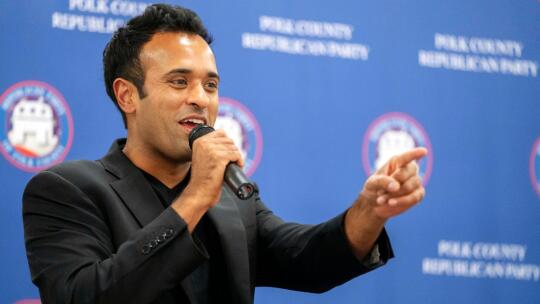The H-1B visa program, highly sought after by Indian IT professionals, permits U.S. companies to hire foreign workers for specialized roles requiring theoretical or technical expertise
Indian-American Republican presidential hopeful, Vivek Ramaswamy, has taken a strong stance against the H-1B visa program, likening it to “indentured servitude.” Ramaswamy has declared his intention to overhaul the existing lottery-based system and replace it with a merit-based admission system if he emerges victorious in the 2024 presidential race, according to reports from PTI.
The H-1B visa program, highly sought after by Indian IT professionals, permits U.S. companies to hire foreign workers for specialized roles requiring theoretical or technical expertise. This program is instrumental for technology companies, enabling them to recruit tens of thousands of employees annually, primarily from countries such as India and China.
Notably, Ramaswamy himself has used the H-1B visa program 29 times. Between 2018 and 2023, his former company, Roivant Sciences, received approval for 29 H-1B visa applications from the U.S. Citizenship and Immigration Services. Despite his personal history with the program, Ramaswamy has criticized it, describing it as detrimental to all parties involved.
He argues that the lottery system should be replaced with a merit-based admission process, characterizing the current system as a form of indentured servitude that primarily benefits the sponsoring companies. Additionally, Ramaswamy has called for the elimination of chain-based migration, emphasizing that family members should not be prioritized over meritocratic immigrants who make skills-based contributions to the country.
The U.S. annually allocates 65,000 H-1B visas to applicants from all backgrounds and an additional 20,000 to those with advanced U.S. degrees. In July, Indian-American Congressman Raja Krishnamoorthi introduced a bill aimed at doubling the annual intake of highly skilled foreign workers on H-1B work visas, a move highly coveted by Indian professionals
Ramaswamy relinquished his role as the CEO of Roivant in February 2021 but continued to serve as the chair of the company’s board of directors until February of the following year when he announced his presidential campaign. As of March 31, the company and its subsidiaries had a total of 904 full-time employees, with 825 located in the United States, as per Securities and Exchange Commission filings.
When confronted with questions about the contradiction between his policy stance and his past use of H-1B visas in his business endeavors, Ramaswamy’s press secretary, Tricia McLaughlin, drew a parallel with the use of utilities, asserting that policymakers must prioritize what is best for the country as a whole.
The demand for H-1B visas remains high, with U.S. businesses submitting a staggering 780,884 applications for the limited 85,000 slots available in fiscal year 2021, marking a more than 60% increase in demand.
Ramaswamy has openly acknowledged his own family’s immigration history during his opening remarks at the first Republican debate in Milwaukee, highlighting his parents’ arrival in the U.S. with limited means and his subsequent success in founding multi-billion-dollar companies. His stance on H-1B visas draws parallels with former President Donald Trump’s 2016 campaign, wherein Trump, who had also employed foreign workers through H-1B visas for his businesses, initially adopted a stringent position on these workers before later softening his rhetoric.
The U.S. annually allocates 65,000 H-1B visas to applicants from all backgrounds and an additional 20,000 to those with advanced U.S. degrees. In July, Indian-American Congressman Raja Krishnamoorthi introduced a bill aimed at doubling the annual intake of highly skilled foreign workers on H-1B work visas, a move highly coveted by Indian professionals.
***************************************************
Readers
These are extraordinary times. All of us have to rely on high-impact, trustworthy journalism. And this is especially true of the Indian Diaspora. Members of the Indian community overseas cannot be fed with inaccurate news.
Pravasi Samwad is a venture that has no shareholders. It is the result of an impassioned initiative of a handful of Indian journalists spread around the world. We have taken the small step forward with the pledge to provide news with accuracy, free from political and commercial influence. Our aim is to keep you, our readers, informed about developments at ‘home’ and across the world that affect you.
Please help us to keep our journalism independent and free.
In these difficult times, to run a news website requires finances. While every contribution, big or small, will makes a difference, we request our readers to put us in touch with advertisers worldwide. It will be a great help.
For more information: pravasisamwad00@gmail.com




